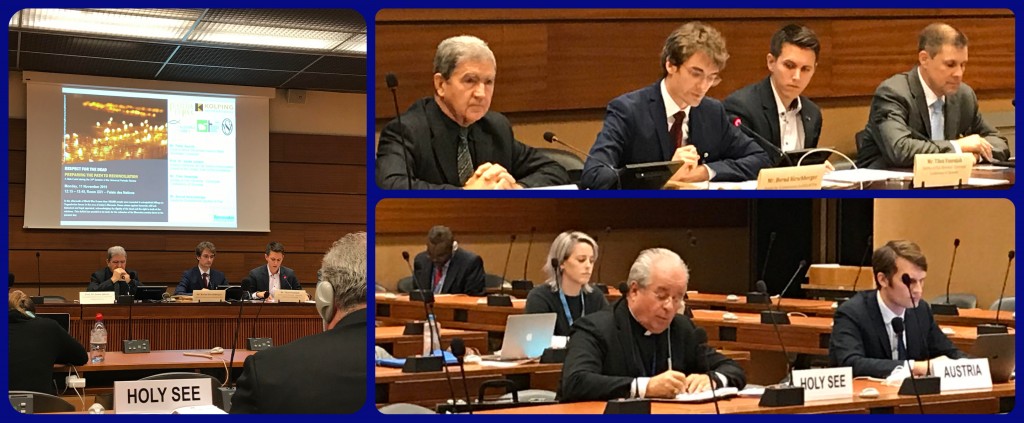
In conjunction with Slovenia’s appearance during the 34th session of the Universal Periodic Review, CCIG provided technical and logistical support to the German Commission for Justice and Peace to assist in the presentation of the side event ‘Respect for the Dead: Preparing the Path to Reconciliation’. The event was co-organized by Kolping International, the Episcopal Conference of Slovenia, New Slovenian Covenant and Association United at the Linden Tree of Reconciliation, with the support of Renovabis.
The event, which took place at the Palais des Nations on 11 November, aimed to highlight how in current day Slovenia, 100,000 persons remain unidentified in 750 plus graves scattered throughout the territory as a result of events which occurred during the concluding period of World War II.
This event provided the opportunity to expose these atrocities to a broader international audience through the Universal Periodic Review process, and subsequently allowed the presenters to indicate areas of reform necessary to ensure the dignity of the victims and their families, provide closure for the perpetrators and allow for the healing of the wider Slovenian society. While not a usual topic for the UPR, which typically reviews the recent and current human rights situation of States every four and a half years, this situation is nonetheless an issue of human rights, with the ongoing, intergenerational trauma still felt to this day.
 Moderator Mr. Bernd Hirschberger (German Commission for Justice and Peace) began by opening the discussion, then handed the floor to Mr. Tilen Vesenjak of Justitia et Pax Slovenia. Mr. Vesenjak outlined the priority of his organisation which primarily focuses on peace and reconciliation efforts concerning World War II events. He introduced the right of victims to be buried individually, which connects to the rights of families to bury their dead with dignity. Mr. Vesenjak explained the greatest barrier to this being completed remain the lack of national legislation regarding a DNA bank which would allow victims to be identified, reburied and/or repatriated if required. Without this resource, Mr. Vesenjak explained, it was impossible to identify the deteriorated remains of the victims in order to successfully fulfill their rights. This request was the key recommendation made to the State of Slovenia.
Moderator Mr. Bernd Hirschberger (German Commission for Justice and Peace) began by opening the discussion, then handed the floor to Mr. Tilen Vesenjak of Justitia et Pax Slovenia. Mr. Vesenjak outlined the priority of his organisation which primarily focuses on peace and reconciliation efforts concerning World War II events. He introduced the right of victims to be buried individually, which connects to the rights of families to bury their dead with dignity. Mr. Vesenjak explained the greatest barrier to this being completed remain the lack of national legislation regarding a DNA bank which would allow victims to be identified, reburied and/or repatriated if required. Without this resource, Mr. Vesenjak explained, it was impossible to identify the deteriorated remains of the victims in order to successfully fulfill their rights. This request was the key recommendation made to the State of Slovenia.
Mr Peter Sušnik of New Slovenian Covenant, continued the discussion in relation to a DNA bank by describing the national legislation which could assist this need becoming a reality. Mr. Sušnik also brought invaluable testimony from the families of victims who state there is no interest in retribution or judicial proclamation – families simply wanted to know what had happened to their loved ones and be given the opportunity to bury them with dignity, according to religious custom and provide closure after this time.
Professor Dr. Janez Juhant rounded out the panel by stressing how restorative the practice of identification and reburial can be. He articulated the need for dialogue promotion and how information is key for the families of all involved.
This side event was attended by a number of delegates from Permanent Missions including the Permanent Mission of Slovenia. Of those who took the floor, there was a genuine willingness to hear the formal recommendations presented at the UPR session the following day and a hope that a progress in the form of legislation and policy would be formulated shortly.